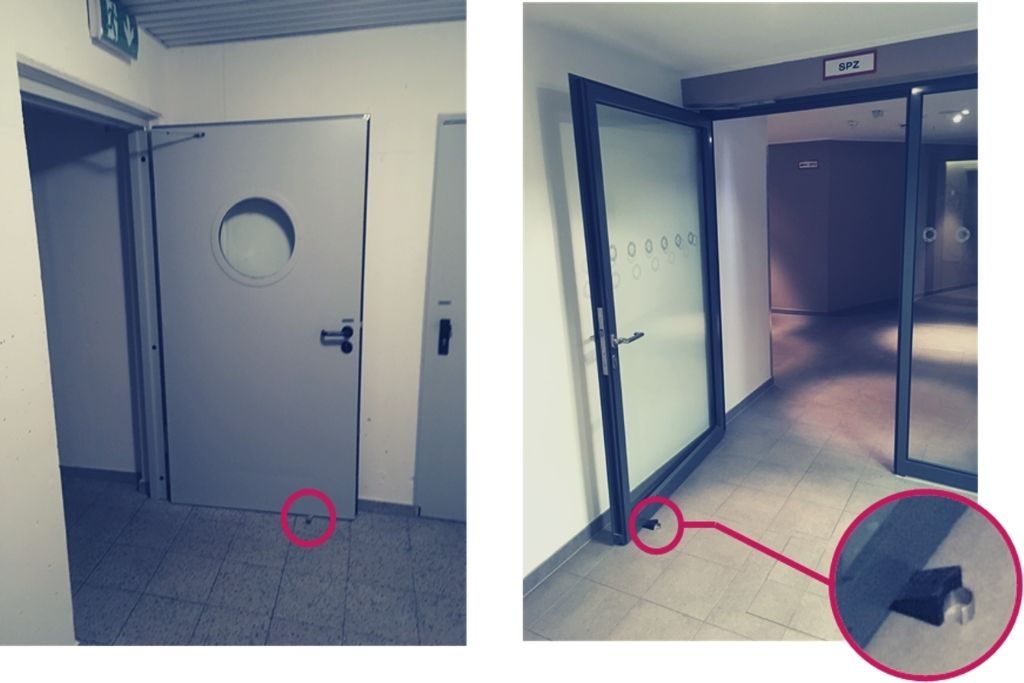In facilities with high people flow such as restaurants, offices, or care homes, a closed door can be a hindrance in daily life. Especially following a hectic schedule, one might not always have a free hand to control a door. Even if they did, especially at a time when hand hygiene is a bigger priority than ever, people might be reluctant to touch a door. Thus, many in this situation give into the common impulse to keep these doors permanently open by using a wedge.
Typically triangle-shaped and made of wood or rubber, these door wedges are inexpensive and ubiquitous ways to maintain an unobstructed people flow. Sometimes, a door wedge can also be an object such as a piece of wood or cardboard.
However, in case of a fire, the seemingly innocent door wedge can cause a devastating personal and financial harm.
Why Are Fire Doors Necessary?
Fires are among the most serious safety concerns in buildings. They’re also the deadliest and most expensive accidents that can happen in a property. Despite some improvements, building fires take thousands of lives every year and cost billions in property damage.
In the last decades, the regulations for fireproofing properties have been getting tighter in both advanced and emerging economies. While fires are not always preventable, there are many effective ways to reduce their risks. A fire door, which is a door that aligns with the fire resistance regulations, is among the essential solutions that can minimize the consequences of a fire.
Fire doors function by containing a fire in one room and slowing down the spread of smoke or flames. As fires need oxygen to keep burning, properly functioning fire doors deny the oxygen flow for the flames to grow. Hence, as it can be a matter of minutes for flames to engulf a property without fire doors, they are vital to a building’s safety strategy.
However, fire doors have a limitation due to their nature: They can only work if the door can be closed.
Cheap Door Wedges Can Come With a High Price Tag
Since fire doors are moot tools with a wedge that prevents them from ever closing, the inexpensive door wedges can result in high financial and personal costs in case of a fire. Wedged doors are known to cause a “chimney effect” and accelerate the spread.
From a legal perspective, if a facility wedges a fire door open, which puts someone’s life at risk, they could suffer penalties, including high fines and even a prison sentence. Likewise, wedged doors can invalidate insurance.
In 2011, a tragedy as such hit Rosepark Nursing Home in Glasgow, UK. After the blazes took the lives of 14 residents, an inquiry concluded that the disaster was preventable in the facility. Some of the rooms where residents slept had wedged doors, which caused the fires to spread quickly.
“When we inspect care homes we rarely turn up to find there’s no fire alarm or fire doors etc; it’s how they’re managing and dealing with it,” said Nick Coombe of London Fire Brigade.

Door Must Reduce Fire Risks, Not Increase Them
Nevertheless, it’s still possible to remain compliant with fire regulations while still facilitating convenient access. Fire doors can be equipped with electrically powered hold-open devices, allowing them to remain open without the need of an external wedge, and automatically close in an emergency.
Depending on the model of the fire door, they might have these systems pre-installed, but it’s also possible to retrofit them with battery-operated solutions. An inbuilt smoke detector, ideally connected to the building’s central system, can activate the door closer as soon as the alarm goes off.
Given the potentially dire consequences of wedging the fire doors, facility managers must ensure their doors reduce fire risks instead of increasing them. They can achieve this by not only by aligning their doors with fire regulations, but educating their peers about the dangers of the seemingly innocent door wedges.






